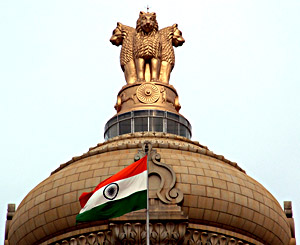


IF you want to have a say in the way in which your country is run, step into the most-sought-after career choice, the Civil Services. Cracking the Prelims and the Mains will take you up a structured career ladder that could finally see you as a secretary or more, having a say in most of the policy matters.
Civil Service exams is considered one of the most stringent and elaborate exams conducted by the UPSC. Government has also approved a proposal to introduce an aptitude test (Civil Services Aptitude Test).
However, this year the shortlisting of candidates for the mains exam will be done through the preliminary examination. The candidates usually opt for the top three services: Indian Administrative Service, Indian Police Service and the Indian Foreign Service, followed by Group ‘A’ and Group ‘B’ services.
Group 'A' Services: These include: Indian P&T Accounts and Finance Service; Indian Audit & Accounts Service; Indian Revenue Service (Customs and Central Excise); Indian Defence Accounts Service; Indian Revenue Service (Income Tax); Indian Ordnance Factories Service; Indian Postal Service; Indian Civil Accounts Service; Indian railway Traffic Service; Indian railway Accounts Service; Indian Railway Personnel Service; Indian Defence Estates Service; Indian Information Service; Indian Trade Service; Indian Corporate Law Service. For other services, see http://persmin.nic.in/
Services
Vacancy*
Indian Administrative Service
NA
Indian Foreign Service
NA
Indian Police Service
NA
Group 'A' Services
NA
Group 'B' Services
NA
Total
965
*Based on exam scheduled on 23 May 2010
**Group-wise break-up is not available beforehand
Group 'B' Services: Defence Forces Civil Service and Civil/Police Service of the Union Territories in India and various other services. For details see http://persmin.nic.in/
The Preliminary Exam, conducted at 45 centres across the country, usually in the 3rd week of May every year, is followed by the Mains and Personality Test conducted by the UPSC for the shortlisted candidates. For the Civil Services (2009) 2441 candidates were selected for Personality Test being held from 22.03.2010 to 06.04.2010. The number of attempts is limited to four.
Eligibility: Apart from nationality, age, sex and marital status, the minimum educational qualification is a graduation degree from any of the recognised universities, or declared to be deemed as a University or possess an equivalent qualification (refer Table 1).
Fee: Rs. 50 payable to through a single Central Recruitment Fee Stamp available at Post Offices. Fee is exempted for all female candidates, the physically handicapped, SC and ST candidates. Those admitted to the Main Exam need to pay a further fee of Rs. 100.
About the Exam
Civil Services (Preliminary) Written Exam: It consists of only objective type questions with multiple choices answers. It is divided into two papers: General Studies Paper (150 marks) and Optional Subject Specific Paper (300 marks) of two hours each. Preliminary Exam serves as a screening test for qualifying in the Mains Examination. The number of candidates to be admitted to the Mains Exam is 12-13 times the total approximate number of vacancies to be filled in that year.
One could choose any one of the 23 subjects listed alongside as the optional subject. The General Studies paper includes questions from general science, current events of both national and international importance, history of India and Indian national movement; India and World Geography, Indian Polity and Economy and General Mental Ability. Questions in the optional subject would be such that they are able to assess the candidate's understanding and knowledge about the subject.
Civil Services (Main): This consists of nine papers of conventional essay type. The nine papers, each of three hours duration, are as follows:
Optional Subjects
Agriculture; Animal Husbandry & Veterinary Science; Botany; Chemistry; Civil Engineering; Commerce; Economics; Electrical Engineering; Geography; Geology; Indian History; Law; Mathematics; Mechanical Engineering; Medical Science; Philosophy; Physics; Political Science; Psychology; Public Administration; Sociology; Statistics and Zoology.
Anthropology; Commerce & Accountancy; History; Management; Political Science & International Relations and Literature of one of the following languages: Arabic, Assamese, Bodo, Bengali, Chinese, Dogri, English, French, German, Gujarati, Hindi, Kannada, Kashmiri, Konkani, Maithili, Malayalam, Manipuri, Marathi, Nepali, Oriya, Pali, Persian, Punjabi, Russian, Sanskrit, Santhali, Sindhi, Tamil, Telugu and Urdu
Paper I - any one of the Indian languages included in the Eighth schedule of the Constitution (300 marks);
Paper II - English (300 marks);
Paper III - Essay (200 marks); Papers IV & V - General Studies (300 marks each);
Paper VI, VII, VIII & IX - any two subjects (each subject has two papers) opted by the candidate from the list of optional subjects given above (300 marks for each paper).
The questions in Paper I & II will be of matriculation or equivalent standard and will be of qualifying nature. However, Paper -I is not compulsory for candidates hailing from the seven north-eastern States except Assam.Any two subjects from the list given alongside could be chosen as the optional subjects. There are certain combination of subjects that are not permissible for candidates to opt from.
These subjects are: (a) Political Science and International Relations and Public Administration (b) Commerce and Accountancy and Management (c) Anthropology and Sociology (d) Mathematics and Statistics (e) Agriculture and Animal Husbandry & Veterinary Science (f) Management and Public Administration (g) of the engineering subjects, viz. Civil, Electrical and Mechanical - not more than one subject and (h) Animal Husbandry and Veterinary Science and Medical Science.
The Personality test or better known as interview is of 300 marks. In this test the candidates are assessed on their overall personality, including their understanding of the subjects opted, individual opinion on different issues of national and international importance and personal interests.